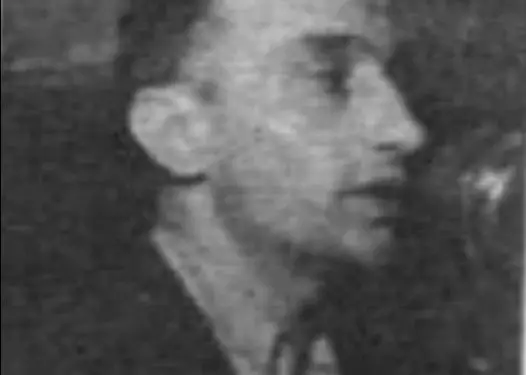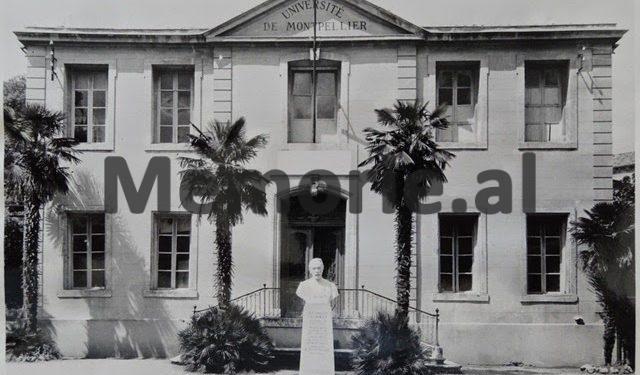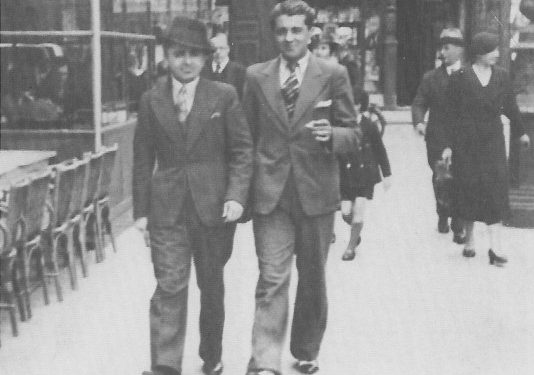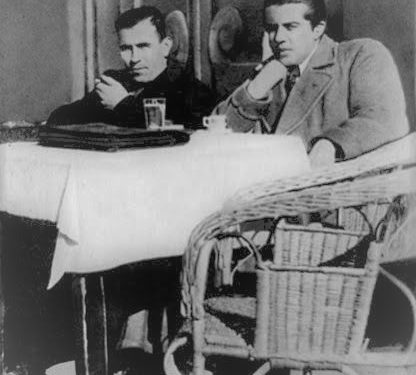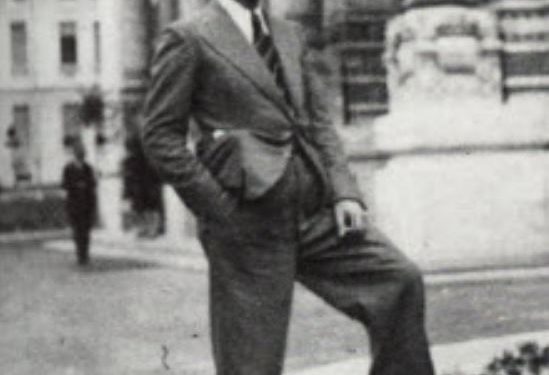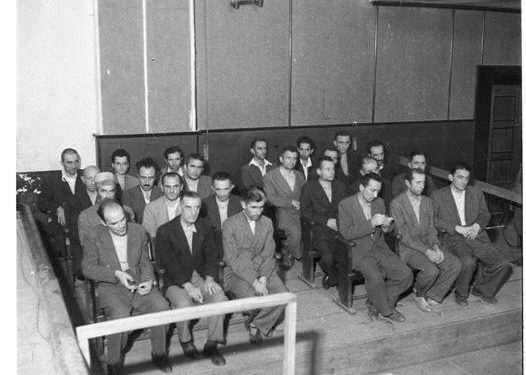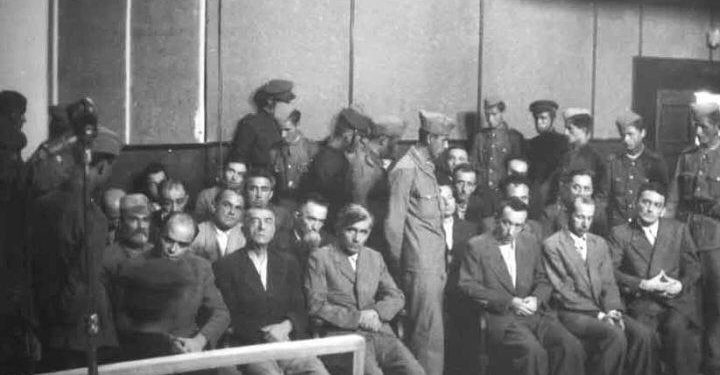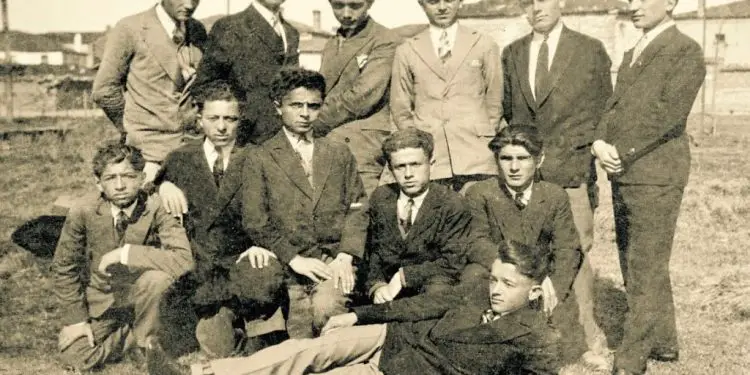Dashnor Kaloçi
Memorie.al publishes the unknown story of Foto Bala originating from the village of Vuno in Vlora, whose father, Dhimitri, after serving as District Commander of the Gendarmerie in Libohova and Delvina, in 1924 he participated in the “June Revolution Led by Fan Noli, (his friend Vatra’s emigration to the United States) and after the fall of his government and the return of Zog to power, he emigrated abroad to return in 1939 after the occupation of Albania by fascist Italy, being appointed Questor in the district of Vlora. Photo school in Lice of Gjirokastra and then that of Korça, where among his closest friends, was Enver Hoxha, with whom they slept together in a room in the house of Aunt Poliksen, until they graduated and both won by a state scholarship from the government of King Zog to study at the University of Montpellier in France. Foto returned to Albania and was appointed as a lecturer at the Lyceums of Tirana and Korça, where in 1939, he had a heated debate with his friend, Emnver Hoxha, who told him: “When we communists take power, you Foto and your whole body will not be trampled underfoot. The arrest of Professor Bala in 1946 with the “Group of Deputies” and his sentence initially to death and then to 25 years, of which he suffered for 17 years, after he refused to apologize to his former friend of the school, “Commander-in-Chief”, Enver Hoxha, during a visit he made in July 1952 to the Rinas camp where political prisoners were building the new airport!
It was the end of July 1952. At Rinas Airport, hundreds of political prisoners working with pickaxes, shovels and handcarts in the midst of the scorching heat were informed by the camp command that he would arrive there that day to see the work, himself Commander-in-Chief, Colonel-General, Enver Hoxha. One of the prisoners, a tall, slightly emaciated man, who wore a hat made of cement paper to protect himself from the scorching sun that crossed the endless field from dawn to dusk. , as he wiped the sweat dripping from his handcuffs filled with dirt, he heard one of his friends call out to him: “Professor, professor, they are looking for you in command.” Foto Bala, a former student of Philosophy laureate in Montpellier, France and professor of the classical high schools of Korça and Tirana, under the curious gaze of his imprisoned accomplices, slowly set off towards the command offices, where he was met by one of his former closest comrades who already ruled the communist state: Enver Hoxha.
Dhimitër Bala, prefect in Korça and Durrës and Kuesor in Vlora!
The photo was the only son of Dhimitër Bala, who was born in the village of Vuno on the coast of Vlora, in 1895 in one of the largest families in that province. At that time, he took an active part, giving his contribution to the state administration of the newly emerged state by the Congress of Lushnja. Thus, he was appointed as the District Commander of the Gendarmerie in Libohova and Delvina. In 1924, during the armed uprising of anti-government forces led by Fan Noli, Bajram Cuuri, Luigj Gurakuqi, etc., or as it is otherwise known from the historiography and propaganda of the communist regime before the ’90s, as the “June Revolution Which led to the overthrow of Zog, Dhimitër Bala sided with Fan Noli, an old friend from the time of “Vatrë” in America. After Zog returned to power, Dhimitri emigrated to Greece together with his friends Zenel Gjoleka, Haki Tatzati and Spiro Koleka, settling on the island of Corfu and in Zante. Dhimitri together with his anti-Zogist comrades stayed in these islands until 1939, when fascist Italy carried out military aggression against Albania. At that time, they responded to the call: “Homeland in danger”, which King Zog made to all patriots and his opponents who were emigrating outside Albania, and most of them returned to their homeland. After that, in 1940, Dhimitri was appointed Prefect in Korça and Durrës. In 1942, he accepted the position of Questor of Vlora. Regarding this action of his, in a letter he sent to the family at that time, he wrote, among other things: “I know that you will be surprised by my appointment to this position, but I have started to do something for Albania.”. At the end of the war at the end of 1944, he was arrested in Tirana and after several months of investigation, was shot on the night of June 26, 1945, along with the white Russian Michael Krasenski. Viktor Dosti, one of those who stayed with Dhimitr in his cell until the last hours before his shooting, recalled, among other things: “I approached him and gave him some fruit to eat. He hugged me and said: Eh mor son I will eat earth tomorrow… “!
From Montpelje to Korça and the debate with Enver Hoxha
Although he was the son of Dhimitër Bala, one of the most active political opponents of the Zogist monarchy, Foto Bala managed to win a scholarship from King Zog in 1929 and go to study in France. He enrolled at the University of Montpellier for Philosophy and Literature and graduated in 1934, graduating with honors. During the years that Foto was studying in France, along with many Albanian friends who studied there, he also had a close friendship with Enver Hoxha. This friendship between them had started from the time when they both studied together in the Lyceum of Gjirokastra, and later after its closure, in that of Korça, where they both slept in the same room at the house of Aunt Poliksen. After graduating in 1934, Foto Bala returned to Albania and the Ministry of Education appointed him to the city of Korça, as a lecturer at the school where he had once been a student and from where he was able to obtain a state scholarship to Montpelje. During all the time that Foto served there as a lecturer, he excelled and was part of the cream of the city’s intellectual elite, most of whom had graduated from school and graduated from the most prestigious Western universities, mainly the French. Regarding the close friendship that Foto Bala had with his friend Enver Hoxha, which had started from the lower class banks of Gjirokastra, his daughter Drita, among other things, recalled: “I often remember during the conversations I had with his father, it was also about his ex-boyfriend Enver Hoxha since childhood.The father never cursed anyone, this was also the case for Enver, with whom, although they had shared the paths of life since the late 1930s Thus, although they had a very close friendship with each other, from the philosophical and political worldviews and views, they had many things in common.The father had more of the social-democratic views of that time and was in the social circle of Skënder Muço, Musine Kokalari, Veli Frashëri, etc. From these points of view, they often quarreled, so, at the end of 1939, when Enver had approached the communist circles of Korça workers, led by Miha Lako, g During a political conversation, he had said to his father in euphoria: “When we communists take power, you, Foto and all of you, will not get your feet and nowhere…”! “The father was outraged by this and had returned it very harshly, offending him severely.”
Lecturer at the Lyceum of Korça and publicist in the press of the time
In the city of Korça or as it was called at the time “Little Paris”, Foto Bala was assigned to teach the subjects of Philosophy, Literature and French in that classical Lice that was opened by the French and was one of the highest quality high schools in the whole Balkans. In addition to teaching at that school, the young professor Foto Bala devoted himself to journalism, writing in several newspapers that were published at the time, such as: “Bota e Re” and “Gazet e Korçës”. In those articles, he mainly addressed the situation of Albanian women and the role she had and should play in the social life of the country. After serving for several years as a lecturer in the city of Korça, at the end of 1939, Foto Bala transferred from there and was appointed to the gymnasium of Tirana, as a lecturer of Philosophy and French. He stayed in that gymnasium until the end of 1941, when he would be appointed again in the city of Korça, where he would work until the end of 1944. During those two years of residence in Tirana, he was part of the most intellectual social circles. of that time, having close friendships with Nonda Bulka (known since the time they studied in France), Abaz Ermenji, Hilmi Hysin, Isuf Hysenbegas, Engjëll Çoba etc.
Sentence with the “Group of Deputies” and meeting with Enver in the Rinas camp!
A few days after the elections of December 2, 1945, Professor Foto Bala was arrested together with the “Group of Deputies” led by Shefqet Beja, Enver Zazani, Sheh Karbunara, etc. This arrest, as for Foton and many others who had known him, came quite unexpectedly. The first: that he had never been actively involved in politics, although he had unreservedly morally supported the socially-democratic group of Musine Kokalari and Skënder Muço. Second: he had been on the deportation lists to Italy as an anti-fascist, and had been able to escape thanks to the intervention of his father (Dhimitri) at the Minister of Interior, Mark Gjonmarkaj. Third: and the most important thing that was considered by many people, was the fact that Professor Bala had been Enver Hoxha’s closest friend since childhood. Since Enver could not forgive his father, Dhimitr, who was shot, it was thought that in order to wash that thing, he would not arrest Foton, who was not guilty. The “MPs’ trial”, with which Foto was also tried, sentenced him first to death and then to 101 years in prison. After the abolition of the sentence of 101 years (maximum sentence was reduced to 25 years) and several amnesties, Professor Foto Bala suffered for 17 years in the camps and prisons of the communist regime headed by his former childhood and study friend. Thus, he tried Maliqi, Beden of Kavaja, Zadrima, Rinas, etc. While serving his sentence in the Rinas camp where the airport was being built, Enver Hoxha himself went to see the progress of the works. That day, Enver asked his ex-friend Foton for a meeting and during the conversation he said: “Photo, admit that you have done something wrong and apologize, otherwise you will rot in prisons and camps”. After Enver’s words, he replied very calmly: “I have not done anything wrong, and I have no reason to apologize.” Enver, who did not expect such a harsh reaction from his ex-friend, turned to him and left: “Well, take a photo, know that you will rot here”.
Welcomes the break-up with the Soviets in ’61
Towards the end of 1961, when Foto Bala was still serving his sentence in the prisons of the communist regime, he decided and wrote a letter to Enver Hoxha, in which he welcomed his decision to break with the Soviets. Among other things, in that letter he wrote: “… Very dear Enver. The time has come for me to address myself like this again. This action of yours (for breaking with the Russians), justified our views and confirmed those of Albanian nationalism. We were enemies, but today for the sake of the cause of Albania, we must sacrifice, leaving behind many things, enough to save Albania …! “. After this letter, which went to Enver, his family was deported from Tirana (his wife and two daughters), sending him to the village of Gradishtë in Lushnja. Professor Foto Bala was released from the prisons of the communist regime on April 21, 1963, after suffering for 17 years. (He had earned a few years with work). Having nowhere to stay in Tirana, he voluntarily went to his family in Gradishtë, Lushnja, and then settled in the city of Korça, with forced residence. In the city where he had spent some of the most beautiful years of his life, he was appointed as a laborer on an agricultural farm, to open new lands, following the directive: “Let us sew on the hills and mountains, and make them fertile like the fields “, thrown by his former childhood friend Enver Hoxha, who was in charge of the state. After being able to obtain a medical report, he left that job and locked himself in his home, devoting himself to studies and translations. He died in March 1991 in the city of Korça, exactly those days when that power was falling, about which his former friend Enver Hoxha had spoken, since 1939 and had made it a reality for him and all Albanians.! Memorie.al




